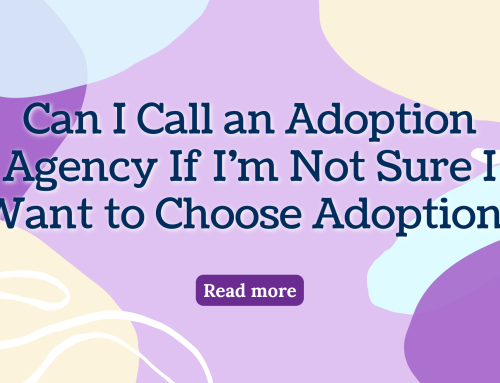Understanding your rights as a birth parent and why your rights are important
Adoption is often described as a beautiful gift, and it is. Placing your child for adoption is a selfless act. But for a birth parent, adoption is also tremendously challenging.
While facing an unplanned pregnancy, you may experience many emotions. It is common to feel denial, anxiety, fear, shock, and depression. There are ways to manage these feelings and still have a positive journey during your pregnancy.
If you are considering adoption for your baby, you may have already heard about open and closed adoptions. But what exactly are your rights as a birth parent?

What are my Rights as a Birth Parent Before Finalization?
Adoption laws differ in every state, but some commonalities stretch between states. For each case, the rights of each birth parent can be different.
As a birth mother, you are in total control of the adoption process until you sign the relinquishment of rights. That means you can change your mind about the terms of your adoption plan and even placing for adoption.
As a birth parent, you are also always in control of your birth and adoption plan. You decide. You decide between an open or closed adoption. You determine the amount of contact you want. You even decide if you would like to hold your baby after you give birth.
Before the adoption is finalized, you have full complete control over your pregnancy, your adoption journey, and the decisions you make. An adoption agency or attorney will help you explore all your options and guide your choices.
What are my Rights as a Birth Parent at the Hospital?
Until your adoption is finalized, you can decide to parent your child. At the hospital, you remain in control of your adoption plan. You may decide it is too hard to hold the baby after giving birth. You may change your mind at the hospital and decide you want to hold your baby- and that is okay. It is essential to know that you have that option.
As a birth parent, you have a right to proper care and treatment at the hospital. No person can make you feel lesser than for your choice to place or keep your child.
What are my Rights as a Birth Father?
A birth father has equal rights to parent the child. Therefore the birth father must be aware of the child and relinquish his rights, for an adoption to be finalized,.
Each state requires different time periods and types of notice before finalization. In some states like New York, taking part in unprotected sex (with the knowledge that a baby can result) alone is enough notice to move forward with finalization. In other states, the birth father must be notified either in person or via a letter in the mail. If the location of a birth parent is unknown, states like Pennsylvania still require an alternate form of notice like a newspaper before an adoption is finalized.
Once given notice, the birth father receives revocation time (amount varies by state) to understand his role, responsibilities, and right. After this period, he can decide to either parent the child or pursue adoption and relinquish his rights. In court, a lawyer must also be able to prove that the birth father was given notice.
In some states, birth fathers can sign a relinquishment of rights before the child’s birth. No state currently allows a birth mother to give her consent until after a child is born.
What are my Birth Parent Rights After Finalization?
After court finalization, you will relinquish all your parental rights. However, you can still maintain contact with the adoptive parents and your child in an open adoption agreement. Though the degree of openness is different for each case, most open adoptions include some form of contact either through call, text, email, or even video chat.
Although you may be unprepared to parent, you still can have a role in your child’s support system. In an open adoption plan, you can agree upon a number of visits during the year. Visits are beneficial to the healing process for birth parents because they allow you to be comfortable in your decision to place your child for adoption. You can watch your child grow and share your life experiences and journey with them.
What is a Revocation Period?
In most states, the law offers some length of a revocation. A revocation period refers to the amount of time a birth parent gets to revoke consent after signing parental relinquishment papers. Some consents are irrevocable upon signing, which means there is no revocation period.
These periods vary by state. In a situation where a birth mother and adoptive family live in different states, the birth mother can choose which laws to adhere to regarding the adoption. Most mothers will pick the state with a longer revocation period. This period allows the birth parents to be 100 percent comfortable with their decision to place their child.
No friend, family member, adoption professional, or healthcare worker can force you into adoption or stop you from choosing to parent. Until the revocation period from your state has officially passed, or you sign the relinquishment of rights, you can still parent your child.
Importance of Knowing Your Rights
Like any parent, you will always have the right to love your child and do what is best for them. No person can influence you or force you to decide to adopt. It is your decision.
Knowing your rights as a birth parent, can keep you from getting taken advantage of and make you comfortable in your decision to place. While an agency or adoption attorney is there to guide you and support you, you may have to advocate for yourself. Inform hospital personnel of your adoption plan before even giving birth so they are aware of the situation.
In some cases, the hospital staff is unaware of the laws regarding adoption. If the birth mother is under the influence of drugs or alcohol after giving birth, the hospital may contact the state. You have the right to choose adoption for your child, the right to contact an adoption agency, and pick the family. Understanding your rights allows you to ensure you and your baby get the proper and correct care.
Looking to learn more about adoption? Check out these articles:
Unplanned Pregnancy | 6 Questions To Ask Adoption Agency (pregnancyadoptionoptions.com)
Is Placing My Child For Adoption The Right Choice? – (pregnancyadoptionoptions.com)





